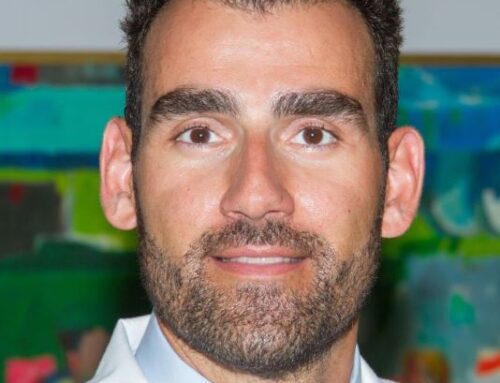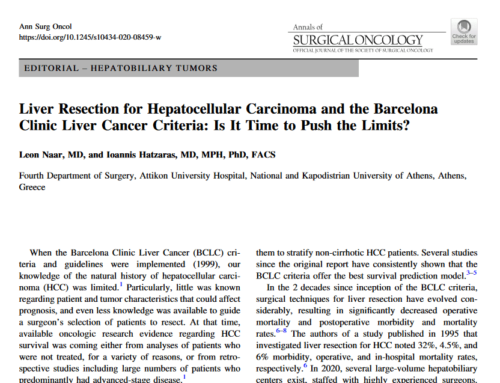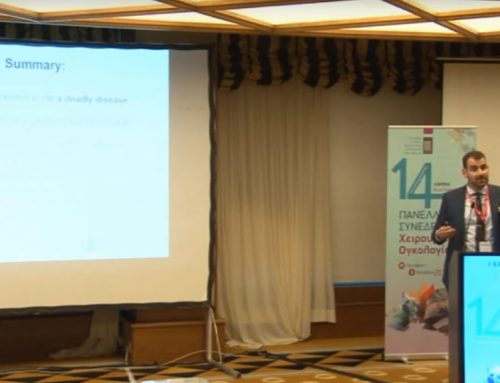ATHENS – After living in the United States for the last 17 years, Dr. Ioannis Hatzaras, a distinguished cancer surgeon, made the decision to move back to Greece. The Thessaloniki native relocated to Athens in September and is now Vice Chairman of the 1st Department of Surgery at Hygeia Hospital and a visiting Professor of Surgery at the Medical School, National & Kapodistrian University of Athens. He spoke with The National Herald about making the move and helping to reverse the so-called “brain drain.”
TNH: What has the experience been like relocating to Athens after your time in New York?
Dr. Ioannis Hatzaras: I grew up in Greece, went to Medical School in Thessaloniki, but I have lived in the United States for the last 17 years, and in New York the last six. I always had in my mind returning to Greece “at some point.” I have been fortunate that my career here kept giving me opportunities I couldn’t say no to. In March last year, I was invited to give a talk at a major cancer center on the west coast, and a job offer followed – a major job offer. Initially I was thrilled – it was very tempting to move to Los Angeles. Around that time however, we had a medical issue in my family back in Greece. I travelled there, and spent a month around Easter in Athens. So here I was, walking around Athens, meeting friends and colleagues at the private medical practices and the University of Athens, with the goal of helping my loved family member achieve the best care. The experience got me thinking very fast about relocating to Athens and starting a practice there. I felt the timing was right, and I knew that if I had taken the LA job it would have made it all the more difficult to move to Greece later in life. There was some risk involved, sure, but I thought to myself, even if this doesn’t work out, I may lose a couple of years of professional time, but it is worth it on a personal scale, plus, I could always come back to the United States. So, I spoke to a few friends and colleagues in Athens, whom we collaborated with on clinical research projects over the years, we drew some solid plans and presto, in September I was an Athenian.
 TNH: What are some of the challenges you have had to deal with and what are the rewards of being in Greece at this time?
TNH: What are some of the challenges you have had to deal with and what are the rewards of being in Greece at this time?
IH: I was somewhat apprehensive of the transition, and I was dreading facing Greek bureaucracy! I was pleasantly surprised. A lot of the state bureaucracy has been shifted on the cloud, and e-governance is very real! I relocated to Athens at the end of capital controls, so I had no issues opening bank accounts and establishing financial presence and business entities for my private practice. I am reminded, when I graduated Medical School in 2002, it had taken me six weeks to get a Medical License in Thessaloniki (mind you, it can still take up to six months in New York!). This time around it took merely a few weeks to navigate the tax, insurance, legal, and other state authorities. Sure, there were times when things were frustratingly slow; it helps to ask for advice, and it definitely helps to have an experienced lawyer help you. Overall, it was a tad smoother than I had expected.
TNH: How are you adjusting to Athens?
IH: Athens is an extraordinarily vibrant city. Despite the decade long financial crisis, it has maintained its multicultural soul and rhythm. I think the financial crisis made it into a better city, a city with grit. I love living here. In my line of work, I treat patients with liver, pancreas, and stomach cancer. These are difficult, potentially life-threatening health problems. I do complex operations that typically last four to six hours. Helping Greek patients has always been a source of joy, from when I was a resident at Johns Hopkins Hospital to my time as a surgeon in New York City, treating our Greek-American community. In Athens, I have been fortunate to find very well-trained partners to help me provide the same level of care, if not higher, that I was used to in New York. So, to function as a surgeon in Athens, is a professional joy. In addition, in my academic role, at the University of Athens, I have an opportunity to stimulate the minds of Greek medical students and trainees, and offer much needed mentorship in their own academic pursuits, an element of my professional life that has always been extremely gratifying. I do miss my collaborative research groups, but my partners and I are making arrangements to bring these efforts to Athens as well. I still work six days a week, and I am on call 24/7, just like in New York. But, at the end of my day, I can meet a group of friends at a restaurant in Centre, have a bite of delicious food, a sip of heavenly wine, and breath in a sense of belonging.
TNH: Is there any advice for anyone thinking about returning to Greece from living abroad, reversing the “brain drain”?
IH: Returning to Greece after many years abroad can be wonderful and professionally very gratifying. Please note, that financially it may be not be as rewarding as work life can be in the U.S., however, the cost of living is lower, and in my humble opinion, the quality of life is higher. I would advise everybody who has been successful in the U.S. to examine his/her position in life and consider taking the leap of faith, if feasible. Most of my friends are in Academia, a professional life that offers flexibility. Perhaps a year of sabbatical to do research and teach in the Greek Universities may be a good start of transition. There is definitely the need and room in Greece for highly trained individuals, with a specific know-how, a strong professional ethic, and lots of energy! Having said that, I cannot speak for professionals in other sectors of life, in business, law, engineering, etc.
Nevertheless, I am optimistic about the country. Greece has faced the crisis bravely, and is slowly turning the corner, notwithstanding, within a very complex world.

Dr. Ioannis Hatzaras during an operation.






